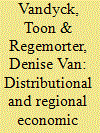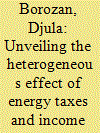|
|
|
Sort Order |
|
|
|
Items / Page
|
|
|
|
|
|
|
| Srl | Item |
| 1 |
ID:
132611


|
|
|
|
|
| Publication |
2014.
|
| Summary/Abstract |
We analyse the macroeconomic and distributional effects of increased oil excises in Belgium by combining a regional Computable General Equilibrium (CGE) model with a microsimulation framework that exploits the rich detail of household-level data. The link between the CGE model and the microlevel is top-down, feeding changes in commodity prices, factor returns and employment by sector into a microsimulation model. The results suggest that policymakers face an equity-efficiency trade-off driven by the choice of revenue recycling options. When the additional revenue is used to raise welfare transfers to households, the reform is beneficial for lower income groups, but output levels decrease in all regions. However, when the energy tax revenue is used to lower distortionary labour taxes, the tax shift is slightly regressive. In this case, national GDP is hardly affected but regional production levels diverge. The impact of the environmental tax reform on income distribution depends strongly on changes in factor prices and welfare payments, whereas sector composition is an important determinant for regional impact variation.
|
|
|
|
|
|
|
|
|
|
|
|
|
|
|
|
| 2 |
ID:
094873


|
|
|
|
|
| Publication |
2010.
|
| Summary/Abstract |
Faced with pressure from greenhouse gas reductions and energy price hikes, the Taiwan government is in the process of developing an energy tax regime to reflect environmental external costs and effectively curb energy consumption, as well as mitigate CO2 emissions through an adequate pricing system. This study utilizes a CGE model to simulate and analyze the economic impacts of the draft Energy Tax Bill and its complementary fiscal measures. Under the assumption of tax revenue neutrality, the use of energy tax revenue generated for the purpose of reducing income tax is the best choice with double dividend effects since it will effectively stimulate domestic consumption and investment, and, consequently, mitigate the negative impacts of the distortionary tax regime. The double dividend effect is less significant, however, when the supplementary measures being used are for government expenditure. Nevertheless, all supplementary measures have effectively reduced energy consumption, which means they have delivered at least the first dividend-in the sense of CO2 emissions control. It has been verified in this study that having adequate public-finance policy measures is the key to realizing the double dividend effect.
|
|
|
|
|
|
|
|
|
|
|
|
|
|
|
|
| 3 |
ID:
162272


|
|
|
|
|
| Summary/Abstract |
The Vietnamese Government is proposing a new tax levy on either petroleum products or coal, or both. That is, the Government expects to increase the current tax rates to the maximum levels set previously. In this instance, the tax on coal is intended to increase by 50%, while the tax on petroleum products is intended to increase by 33.33%. This study employs a computable general equilibrium model to assess the effects of these increases in taxes on the Vietnamese economy, focusing on energy, transportation, and the private sectors. Results show that an increase in tax on petroleum products will considerably affect the country with a reduction of real GDP by 1.99%. Exports and imports are also highly unfavorably affected. In this instance, the total emission level will be reduced by 7.12%. The increased tax on coal, however, will allow Vietnam to experience much lower unfavorable effects, while being able to cut a substantial amount of the emission level. For example, real GDP would only decline by 0.51%, while total emission level will be reduced by 10.25%. If these taxes are increased together, Vietnam will experience considerable contractions in the economy, but it is able to reduce a substantial emission level.
|
|
|
|
|
|
|
|
|
|
|
|
|
|
|
|
| 4 |
ID:
166520


|
|
|
|
|
| Summary/Abstract |
The paper investigates the effect of energy taxes in the European Union (EU) across different levels of residential final energy consumption (RFEC) in the period 2005–2016. The analysis is based on quantile panel regression models that directly and indirectly consider energy taxes. More precisely, the developed models provide a multivariate framework for evaluating their effects and, at the same time, for validating the existence of the energy environmental Kuznets curve (EKC) across the selected quantiles.
|
|
|
|
|
|
|
|
|
|
|
|
|
|
|
|
|
|
|
|
|